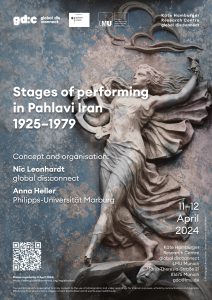11-12 April, Stages of Performing in Pahlavi Iran 1925-1979
 Workshop by Nic Leonhardt (global dis:connect) and Anna Heller (Philipps-Universität Marburg)
Workshop by Nic Leonhardt (global dis:connect) and Anna Heller (Philipps-Universität Marburg)
With the introduction of European drama in the mid-19th century, a new model of theatre emerged in Iran, which in the 20th century developed from a previously amateur activity into an established cultural institution of modern society. In contrast to the processes of social change in Pahlavi Iran (1925–1979), the cultural-historical relevance of the performing arts has not yet been fully explored.
For a holistic approach, this workshop will look at different forms of stage art, including dance, theatre, musical theatre and festivals. The neglect or separate consideration of the musicological aspects of the performing arts reinforces the importance of these forms.
In the context of global theatre histories, understood as the historiography of connections, interweaving, exchanges and dis:connections, the workshop covers a wide range of subtopics. Contributions range from the development of dramatic art and literature in the early Pahlavi era, social criticism and state ideology in the dramatic arts, to opera and stage dance in the late Pahlavi era. The aesthetics of unconventional stages, the theatre of the absurd and the Shiraz Arts Festival are addressed along with biographical approaches to the history of women in theatre.
During the two days of the workshop, we will engage in intensive dialogue on these topics. We will also discuss the increasing methodological obstacles to fieldwork and archival work in the region.
Please register here by 8 April 2024.
Please click here to download the programme
Venue: Käte Hamburger Research Centre global dis:connect, Munich.





